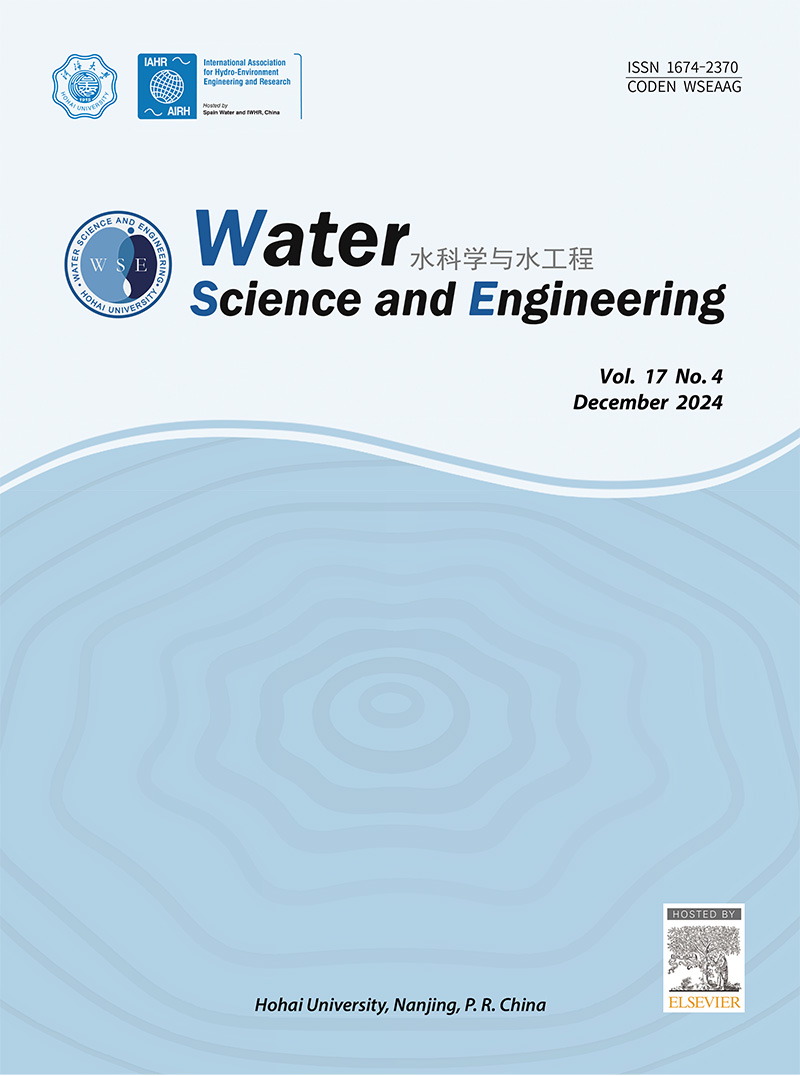用于降解罗丹明 B 的 N-TiO2/g-C3N4 异质结构的制备及其增强的光催化性能
IF 4.3
Q1 WATER RESOURCES
引用次数: 0
摘要
目前已开发出高效光催化剂,用于在可见光下降解受污染的水。本研究采用简单的混合-煅烧法制备了不同 Ti/C 摩尔比的 N 掺杂 TiO2(N-TiO2)和无金属氮化石墨碳(g-C3N4)复合材料。通过 X 射线衍射、扫描电子显微镜、紫外可见光漫反射光谱和光致发光光谱对样品进行了表征。研究了 N-TiO2/g-C3N4 降解罗丹明 B(RhB)的光催化活性,并采用电化学方法确定了 N-TiO2/g-C3N4 光活性增强的原因。结果表明,N-TiO2 纳米颗粒分散在 g-C3N4 表面,并与 g-C3N4 形成了稳定的异质结结构。两种半导体之间的异质结可以有效防止光生电子和空穴的重组,提高光催化剂在可见光照射下的光催化效率。该光催化剂具有很高的稳定性,经过五个循环后,RhB 的降解率仍高于 82.3%。本文章由计算机程序翻译,如有差异,请以英文原文为准。
Preparation and enhanced photocatalytic performance of N-TiO2/g-C3N4 heterostructure for Rhodamine B degradation
Highly efficient photocatalysts have been developed for the degradation of contaminated water under visible light. In this study, N-doped TiO2 (N-TiO2) and metal-free graphitic carbon nitride (g-C3N4) composites with various Ti/C molar ratios were prepared with the simple mixing-calcining method. The samples were characterized by X-ray diffraction, scanning electron microscopy, ultraviolet–visible diffuse reflectance spectroscopy, and photoluminescence spectroscopy. The photocatalytic activity of N-TiO2/g-C3N4 in the degradation of Rhodamine B (RhB) was investigated, and the electrochemical method was used to determine the origin of the enhanced photoactivity of N-TiO2/g-C3N4. The results showed that N-TiO2 nanoparticles were dispersed on the surface of g-C3N4 and formed a stable heterojunction structure with g-C3N4. The heterojunction between the two semiconductors could effectively prevent the recombination of photogenerated electrons and holes and improve the photocatalytic efficiency of the photocatalyst under visible light irradiation. The photocatalyst exhibited high stability, and the RhB degradation rate was still higher than 82.3% after five cycles.
求助全文
通过发布文献求助,成功后即可免费获取论文全文。
去求助
来源期刊

Water science and engineering
WATER RESOURCES-
CiteScore
6.60
自引率
5.00%
发文量
573
审稿时长
50 weeks
期刊介绍:
Water Science and Engineering journal is an international, peer-reviewed research publication covering new concepts, theories, methods, and techniques related to water issues. The journal aims to publish research that helps advance the theoretical and practical understanding of water resources, aquatic environment, aquatic ecology, and water engineering, with emphases placed on the innovation and applicability of science and technology in large-scale hydropower project construction, large river and lake regulation, inter-basin water transfer, hydroelectric energy development, ecological restoration, the development of new materials, and sustainable utilization of water resources.
 求助内容:
求助内容: 应助结果提醒方式:
应助结果提醒方式:


